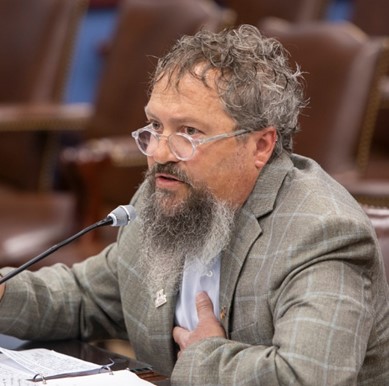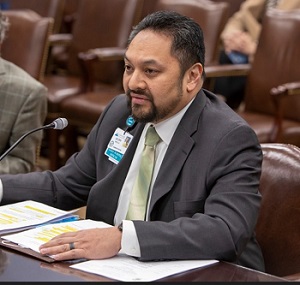Feb. 21, 2023 Hearing Takeaways
Feb 21, 2023
Impacts and Solutions: Charting a Path Through Common Sense State Regulatory Reform
Often, no matter how well-written, a law cannot be drafted in a manner that addresses the minutia of business decisions or industry practices. For that reason, governments around the world rely on bureaucratic institutions to take the intent of a law and from it craft responsible regulations. Ideally, these regulations should provide for guidelines and best practices that mirror the will of the legislature and the capabilities of our regulated communities, but disappointingly this ideal is not always the case. Regulations have been utilized by the Executive Branch and rogue bureaucrats to enact onerous requirements on our people and businesses, and to combat this overreach the House Republican Policy Committee brought together experts as well as the regulated community on Tuesday, February 21st to learn of these pitfalls and concerns within our state and federal regulatory processes.
The testifiers that joined the Policy Committee were as follows:
David Burton – Senior Fellow in Economic Policy, The Heritage Foundation
Robert McCafferty– Operator, North Country Brewing, on behalf of PRLA
Jelden Arcilla, MBA, RNC, NEA-BC - Field Vice President at LifePoint Health® & Chief Nursing Officer, Conemaugh Health System, on behalf of The Hospital and Healthsystem Association of Pennsylvania
| Agenda – Bios – Testimony |
David Burton, Senior Fellow in Economic Policy for the Heritage Foundation, brought his experience in regulatory and administrative law to the day’s hearing. David could not join the Committee in-person, as he primarily works with issues stemming from Federal Government decisions in D.C., but found the time to provide insight and advice for House Republicans to consider when drafting legislation and contributing to the crafting of regulations. In short, David spoke to the necessity of well-drafted concise legislation that does not enable regulators to act outside of the intent of the people’s elected officials and our laws.
Regulators, i.e. the bureaucrats within state departments and agencies, should not be assumed to have benevolent intentions. If given the opportunity laws may be “reinterpreted” in a manner that is contrary to the will of the lawmakers and counter to the interests of Pennsylvanians. Examples of this “reinterpretation” are most commonly found in environmental and financial regulations, and have incurred tremendous impacts throughout the state. As heard in previous hearings, the implications of the Regional Greenhouse Gas Initiative (RGGI), which was undertaken via regulation and on nonexistent legal grounds, caused immense uncertainty for our energy generators and users. Overnight decisions to amend how much profit loss a business can carry-over from one year to the next crushed the dreams of many entrepreneurs and made business far more difficult for those already established here. Pennsylvania’s current means of enacting regulations, enforcing regulations, and disapproving of regulations requires substantial reform on behalf of the legislature and our state agencies.
David prepared a list of suggestions and considerations for House Republicans to abide by as we head into two years of regulatory and legal fights over the intent of long-established precedent and legal interpretation.
| • | Complaining, and complaining alone, accomplishes nothing. | |
| • | Prepare for a conservative majority, and have regulations and proposals ready-to-go long before the political climate shifts. | |
| • | Career bureaucrats will often overstep their authority and powers if allowed. | |
| • | Create mechanisms, like a Congressional Review Act, to legislatively address problematic regulations. | |
| • | Know administrative law, and pay attention to the “rules governing rules” when following the legislative and regulatory processes. | |
| • | Enlist the help of outside groups, but remember that each group has their own interests. | |
| • | Promote localized, pro-freedom, support networks that develop trusted solutions and proposals. |
| “Bureaucracy will not help you. You need to start training people in administrative law, training people in drafting regulations so that they’ll survive judicial review.” David Burton - Senior Fellow in Economic Policy, The Heritage Foundation |
| WATCH: |
 |
Following David Burton’s bird’s-eye view of our current state and federal regulatory climate, and a refresher on the regulatory process, the Committee was joined by Robert McCafferty to hear how regulations impact his brewing company. Robert (Bob) McCafferty is the operator of North Country Brewing, an independent brewery and restaurant, and spoke on behalf of his business as well as the Pennsylvania Restaurant & Lodging Association (PRLA).
In 1998 Bob purchased an old funeral home alongside his wife in Slippery Rock with plans to begin as a restaurant, and then enter the world of brewing. In 2001 Slippery Rock voted to allow alcohol sales, and North Country Brewing opened in 2005. A few years after that the McCaffertys bought a farm and began their own farm-to-table practice, including the raising of their own cattle. In 2012 North Country Brewing opened a cannery to share their products with a larger audience, and then bought the Harmony Inn in 2013. The last two decades have been a whirlwind of risk, successful growth, and entrepreneurship for the McCaffertys.
Mr. McCafferty saw great success through his business’ hard work, excellent products, and keen growth strategy. With that being said, he does not believe such success could be had by entrepreneurs looking to do the same in today’s regulatory climate. To even begin to understand the regulatory process, and new regulations as they reach the regulated communities, would be the equivalent of undertaking a semester-long collegiate course. For the Mcafferty’s business, and many others like theirs, at least one full-time employee is tasked with the sole duty of assuring compliance with all rules and regulations.
As a business in PA, keeping up with the Commonwealth’s regulatory process is demanding. The process, directed by the Independent Regulatory Review Commission (IRRC), is not amenable to the general public’s participation, and thus many small restaurants and lodging providers must rely on PRLA if they want their opinions and voices heard when a lifechanging regulation is being proposed. Contrary to the legislative process, where residents and businesses can communicate directly with their elected officials, the regulatory process allows for limited comment and little assurance that concerns will be considered when the regulation is finalized. Unelected bureaucrats, often directed by the Governor, are capable of making or breaking a business with the swipe of a pen.
Bob shared his concerns with particular regulations, namely those regarding the Tipped Employees and Regular Rate regulations that impact all tipping-reliant industries. Many of the changes through this regulation were already industry best practices and standards, but nuances and subtleties have surfaced following the passage of this regulation that should have been addressed through greater industry consultation and pauses throughout the regulatory process. When finalized, the state regulations are less stringent than federal regulations, resulting in confusion and operators questioning which regulations should be followed. This confusion, and disparity in state and federal regulations, has inspired a “compliance gap” where businesses can never be sure of what the rules-of-the-day are. Restauranteurs and lodging providers are in no way opposed to regulations, but unbalanced, uninformed, and unexpected regulations have created a business climate that is difficult to operate within and puts Pennsylvanian businesses at a competitive disadvantage.
| “We wouldn’t be able to open North Country Brewing today with some of the regulations that have occurred. We’d be out-priced to do so. This hurts Ma & Pa that want to be entrepreneurs today.” Robert McCafferty - Operator, North Country Brewing |
| WATCH: |
 |
Following the insight from our restaurants and lodging providers the Committee was joined by Jelden Arcilla to speak on behalf of The Hospital and Healthsystem Association of Pennsylvania (HAP). Jelden holds an MBA and a Nurse Executive Advanced Certification (NEA-BA), is a Certified Registered Nurse (RNC), and serves as V.P. and Chief Nursing Officer for Conemaugh Health System. He is responsible for maintaining and advancing clinical and patient standards of care, introducing new nursing services, developing and retaining staff, and managing the nursing budget. Regulations are an important element within our healthcare systems, and Jelden shared how state and federal regulations impact and impede the work of our healthcare providers.
Health care is among the most regulated industries in the nation, rightfully so, but the reality of these layers of regulatory requirements and processes is that they take providers away from bedsides, stifle innovation, add unnecessary administrative burdens, and strain facilities’ finances. Providing healthcare is a fluid and everchanging service that must utilize the newest clinical breakthroughs, emerging technologies, and advancements in health information and data management to ensure facility viability and access to care.
Jelden himself shared his own difficulties in his efforts towards Pennsylvania recognizing the licenses and accreditations from other states he had previously practiced medicine in. After moving to PA and expended substantial personal resources, Jelden was forced to wait an entire year before Pennsylvania recognized his credentials, state and federal fingerprints, and deemed his experience and abilities as having met state regulatory standards for a permanent license. This bureaucratic stifling of our healthcare providers should not be the standard, and has worked to discourage professionals from practicing in PA.
A report developed five years ago by the American Hospital Association and Manatt Health found that – at the federal level alone – there are more than 43 agencies, offices, and departments to which our hospitals are accountable. The state regulatory landscape is only slightly less complicated with about a dozen agencies, authorities, and programs to be accountable to. The need to be accountable to regulators requires an average-sized hospital to dedicate 59 employees to regulatory compliance, with a quarter of these employees being doctors and nurses pulled away from bedsides. Per patient admitted, the average cost of compliance is $1,200, and per hospital bed the cost of compliance is $47,000.
Important differences between state and federal regulations are apparent in healthcare just as they were for our restauranteurs and lodging providers. Pennsylvania’s current regulatory structure has remained in place from the 1980s, and does not consider the internet, telehealth, or modern employee operations and care team structures. Size requirements for procedure rooms also differ between state and federal regulations, with Pennsylvania requiring a room to be 600 square feet and the federal government only requiring 400 square feet. These differences in regulation, and outdated regulations, have inspired a common exceptions process to be utilized where our hospital and care providers can pursue ‘expedited’ exceptions to state regulations so long as the health, safety, and welfare of their patients will not be compromised. The need for, and frequent use of, the expedited exceptions process is reason to believe Pennsylvania’s health related regulations are out-of-date.
| “We have to be able to embrace the technology and leverage the changes in innovation in healthcare to be able to do a better job for our citizens.” Jelden Arcilla, MBA, RNC, NEA-BC - Field Vice President at LifePoint Health® & Chief Nursing Officer, Conemaugh Memorial Medical Center - On behalf of The Hospital and Healthsystem Association of Pennsylvania |
| WATCH: |
 |
| WATCH: Questions & Answers from Our Testifiers |
Regulations impact our lives every day. Their purpose is to retain standards, safety, and assurance in our homes, businesses, and environment. But, all too often these regulations are onerous and not polished products resulting from industry involvement and honest cost-benefit analysis. Differences in state and federal regulations cause confusion, and the convoluted means to enact and influence new regulations leaves the regulated community in the dark. The House Policy Committee concluded with Chairman Kail expressing that, “We’re seeing a mosaic form of either tax issues or regulatory issues, and its all coming together to show and tell the story of why businesses, people, and families are leaving Pennsylvania. We want to change that, we need to get serious, and we need to stay away from the status quo we’ve seen in Harrisburg.”